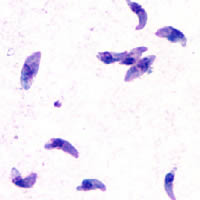
Photo from wikipedia
Toxoplasmosis, caused by the protozoan Toxoplasma gondii, is one of the most widespread zoonoses in the world. It can affect most warm-blooded animals but only felids are its definitive hosts.… Click to show full abstract
Toxoplasmosis, caused by the protozoan Toxoplasma gondii, is one of the most widespread zoonoses in the world. It can affect most warm-blooded animals but only felids are its definitive hosts. We determined seroprevalence and associated risk factors in birds and mammals kept in two zoological parks in northern Portugal. Sera from 77 birds and 42 mammals were assayed for the presence of T. gondii antibodies by the modified agglutination test (MAT, cut-off titre 20); 34.5% (41/119) were seropositive. All seropositive animals were apparently healthy except one seropostive mandarin (Aix galericulata) which had chorioretinitis. This is the first report on T. gondii seroprevalence in wild animals in captivity in Portugal. The present findings indicate a widespread exposure of zoo animals in Portugal to T. gondii.
Journal Title: Veterinary parasitology
Year Published: 2017
Link to full text (if available)
Share on Social Media: Sign Up to like & get
recommendations!